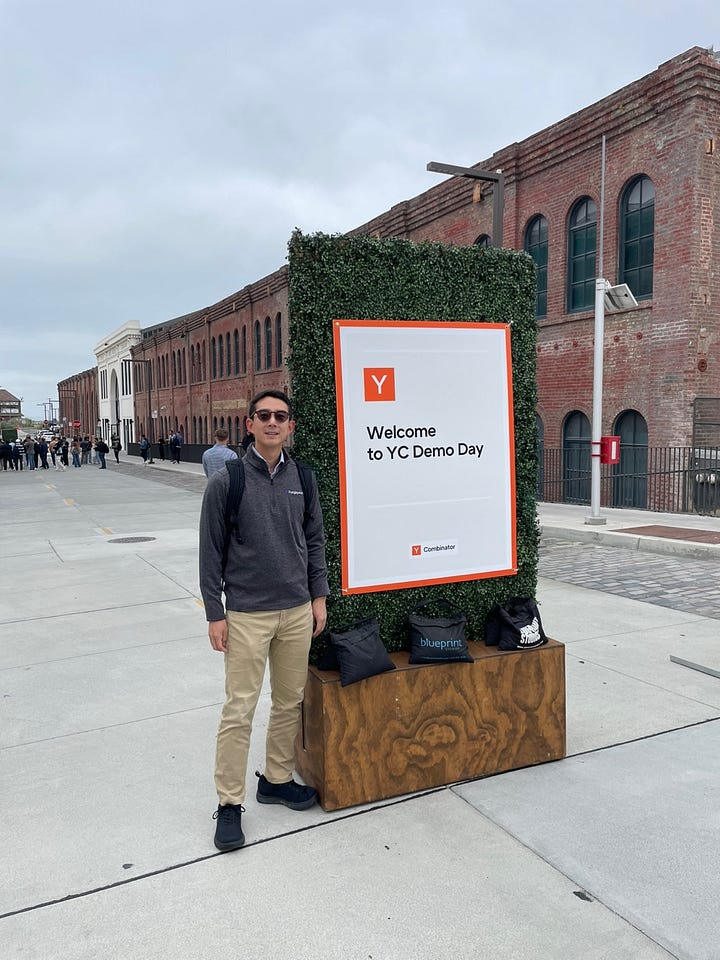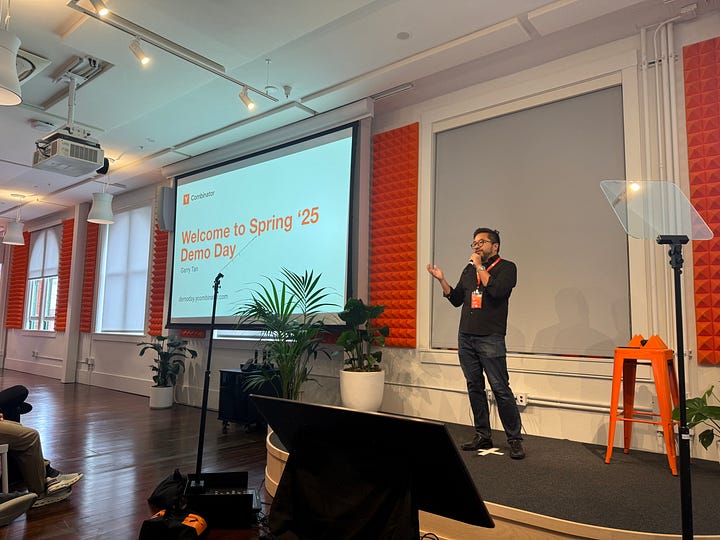Y Combinator's X25 Demo Day did a great job of putting on a show. With rapid-fire one-minute presentations interspersed with networking breaks, lunches, and happy hours, the event effectively showcased the latest AI trends.


The Dominance of AI Agents
A clear theme was the proliferation of AI agents, particularly specialized vertical applications. These agents are rapidly moving into diverse sectors:
SMB bookkeeping automation (Minerva)
AI-native legal back offices (Blueshoe)
Compliance reporting traditionally handled by consultants (Rimba)
Highly regulated manufacturing environments (GroundControl)
This aligns closely with themes from our previous discussion on AI startups (linked here), highlighting essential moats startups must quickly establish to avoid becoming mere features within foundational AI models. Critical moats include:
Deep industry-specific tuning to user preferences
Exceptional user experiences
Cost optimization strategies
Expertise and credibility in highly regulated sectors
When viewed as task-oriented solutions—much like we detailed in the Klarna analysis—specialization enables providers to swiftly gather actionable user data. By concentrating adoption and thus feedback and efficacy data, these specialized solutions are betting that they will be able to more rapidly achieve good or even great performance on a larger core set of tasks within their domain. The strategic hope is for this to allow them to rapidly gain a commanding share of the market and convert their usage into a data & efficacy moat around longer tail tasks.
This specialization yields a secondary advantage that resonates with us as security focused investors, namely a tightened security posture. An agent exclusively designed for compliance reporting, for instance, can descope its risk surface by constraining its activities to only those required for the task at hand. This potentially reduces vulnerabilities (if the descoping means less logic or fewer dependencies are required) and certainly decreases blast radius (by reducing the access and capabilities of the agent), safeguarding enterprise capabilities data.
Autonomous Automation: A "Go Big or Go Home" Strategy
The trend towards fully autonomous solutions is accelerating. However, this approach is not without risk, particularly for large enterprises where tolerance for automation-induced errors is minimal. Thus, startups embracing full autonomy will likely find traction initially within midmarket segments, leveraging smaller-scale opportunities as they collect data and tune their algorithms to minimize error rates before scaling upmarket.
Enterprise buyers should monitor this evolution, proactively assessing the maturity thresholds required for confident adoption. Meanwhile, solutions currently targeting the enterprise space with more conservative human-in-the-loop offerings will need to leverage their deeper enterprise relationships and tackle complex use cases to shore up their competitive edge.
Rising Tide of AI-first Security Startups
A notable uptick in AI-driven security startups points growing interest in the space, likely due to the suitability of the space for automation and the growing pressures faced by security teams – as attackers scale operations, possibly with AI assistance, defenders are forced to keep pace. Key areas of innovation include:
AI agents for web testing: Simulating complex browser interactions to proactively identify vulnerabilities. (Docket)
Security evaluations of AI applications: Critical to ensuring the safe deployment of sophisticated AI agents. (Casco)
AI-driven code security: Addressing vulnerabilities introduced by proliferating AI-generated code. (BitPatrol)
Autonomous security agents: Companies like XBOW have set ambitious valuation benchmarks. Their success hinges on winning trust from security teams. (Mindfort)
These startups are largely aligned to midmarket versus enterprise needs at present, but we expect them to follow the general path of autonomous services and attempt to move upmarket as they prove out their solution on midmarket use cases.
Valuation Observations
The valuation landscape at YC X25 was as expected. Median caps hovered around $30 million, typically accompanied by around 10% dilution. The highest valuation observed reached approximately $70 million. Interestingly, many startups approached Demo Day nearly complete with their fundraising goals, yet most remained receptive to strategic investors who could demonstrably add value.
Reach out to kshih@forgepointcap.com and jpark@forgepointcap.com if you are building something interesting in the security + AI space. Thanks!




